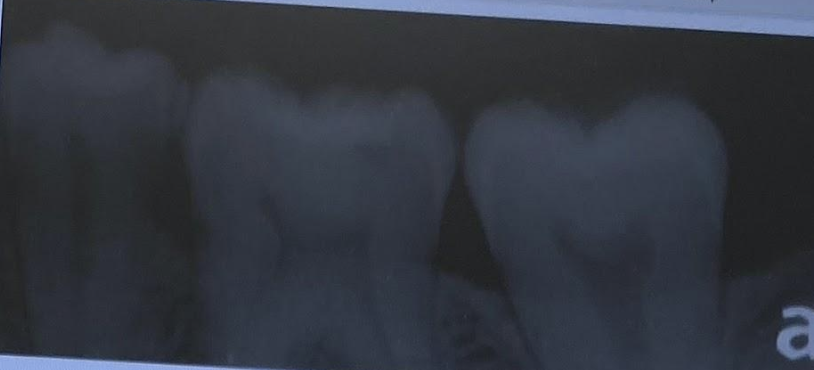Didactic Final Practice Questions
1/36
There's no tags or description
Looks like no tags are added yet.
Name | Mastery | Learn | Test | Matching | Spaced |
|---|
No study sessions yet.
37 Terms
A hatchet with formula of 10-7-14, has a blade width of ___mm
1
The dentin hybrid layer is thicker because of deeper demineralization of the matrix in the following generation of bonding system:
Three-step etch and rinse system
Comparing GI and resin-based sealants, the main advantages of Glass Ionomers are thought to be:
Higher moisture tolerance than resin composite & more fluoride release than resin composite

Which of the following treatments is more appropriate for #19 in your opinion?
One-surface occlusal composite restoration
Which of the following describes #19 better in your assessment section (diagnosis)?
Caries risk: high, #19 occlusal surface caries, pit & fissure origin, moderate extent, active
The standard class I occlusal preparation outline in the following tooth has been traditionally limited to the mesial and distal pits and not crossing the transverse ridge of enamel, because of the relatively small size of the occlusal table
Mandibular first premolars
Aggressive condensation of a hybrid composite in a class I cavity using a condenser improves adaptation and reduces air pockets
False
The concept behind incremental filling is/are _______ reduce(s) polymerization shrinkage stress
All of the options
Radiopacity is mainly a function of the following component in composites:
Filler
A hypothetical cubic occlusal preparation with equal surface area of MDBL and pulpal walls has a cavity configuration factor (C-factor) of
5
Which of the following filler colors absorbs the 480nm wavelength better?
Orange
The advantage-disadvantage of unidose bonding delivery when compared to bottles of the same adhesive are
Compositional integrity better preserved but higher cost
The “selective enamel etching” is most recommended for the following adhesive system(s)
Self-etching adhesives with all-in-one or universal bonding
The initial step of enamel pit/fissure opening for a PRR restoration may be accomplished by any of the following instruments conservatively
Special fissurotomy burs, ¼ round bur, air abrasion
The principles of preventive resin restorations (PRR) include
Proper bonding technique
The inorganic filler loading of modern flowable composites (such as FIltek Supreme Flowable) is reported to be approximately ___
65% by weight (46% by volume)
Compare cavity preparation and restoration concepts between
A: traditional (Black)
B: modern approaches such as PRR
for an occlusal moderate caries lesion in the central pit and stained grooves of #30. They are similar in that they both rely on _______. However, these approaches are different in that B relies on _______, while A relies on ___________.
Mechanical preparation of the tooth and caries removal; minimally invasive preparation and bonding; convergent walls for retention
The conversion of monomers to polymers results in ______ of the composite, which is an intrinsic characteristic of this restorative material and could lead to _____ under high C- factor and ______ under low C-factor situation
Volumetric shrinkage; shrinkage stress development; displacement of the free surface of composite
What are the possible indications of recent flowable composites in contemporary practice?
All of the options
The main determinants of a moderate caries lesion, distinguishing it from an initial caries lesion based on 2015 ADA classification are:
Signs of bacterial penetration into dentin; and enamel surface integrity loss
Proximal carious lesions in the posterior teeth are best detected:
With a combination of visual and radiographic
Which of the following is a risk factor based on the CAMBRA system?
Low salivary flow
The following constituent may typically be found in primer/bonding systems but not restorative resin composites?
Water
Which of the monomers is a functional adhesive monomer that is considered the key to bonding in many adhesive system, mildly etching dentin and bonding to apatite?
10-MDP
Early dentin bonding systems were successfully owing to development of the following key components that was a major difference when compared to enamel bonding:
Dentin primers
The ideal depth of a traditional occlusal composite for cavitated moderate caries lesion is defined as ______, which is based on ______.
1.5-2mm; sufficient removal of caries beyond the DEJ
The most accepted patient position when working on #30 B, with patient head slightly leaning towards the
Left
The universal adhesive such as 3M scotchbond Universal has a pH of 2.7, which is considered ____ and _______ technique is desired for effective bonding to enamel.
mildly acidic; selective etch with phosphoric acid
Placing a single increment of regular flowable composite to fill a large class 1 occlusal preparation, the polymerization shrinkage is likely to result in separation of composite from the pulpal floor.
True
The most common mechanical test to compare contemporary dental adhesives is to measure:
Bond strength
The final polishing steps of composite is mainly aimed at:
Creating a smoother composite surface after the finishing step
Create the desired luster and shine on the composite
The appropriate RPM for the following procedure is around 40,000.
False
Selective etching technique for universal adhesives
Improves bonding to enamel but under rinsing can be an issue
The basic principles of C factor of a preparation suggests that...
Higher ratio of bonded surfaces to unbonded surfaces increases polymerization shrinkage stress
The selection of mouthpiece size for the Isovac system is primarily based on
The patient's range of motion and comfort
Dentist’s work related musculoskeletal disorders
Can result from prolonged work postures and high static muscle load
Are very commonly causes of dentists early retirement
May lead to arm/hand numbness and paralysis
May result from incorrect patient positioning for prolonged dental procedures